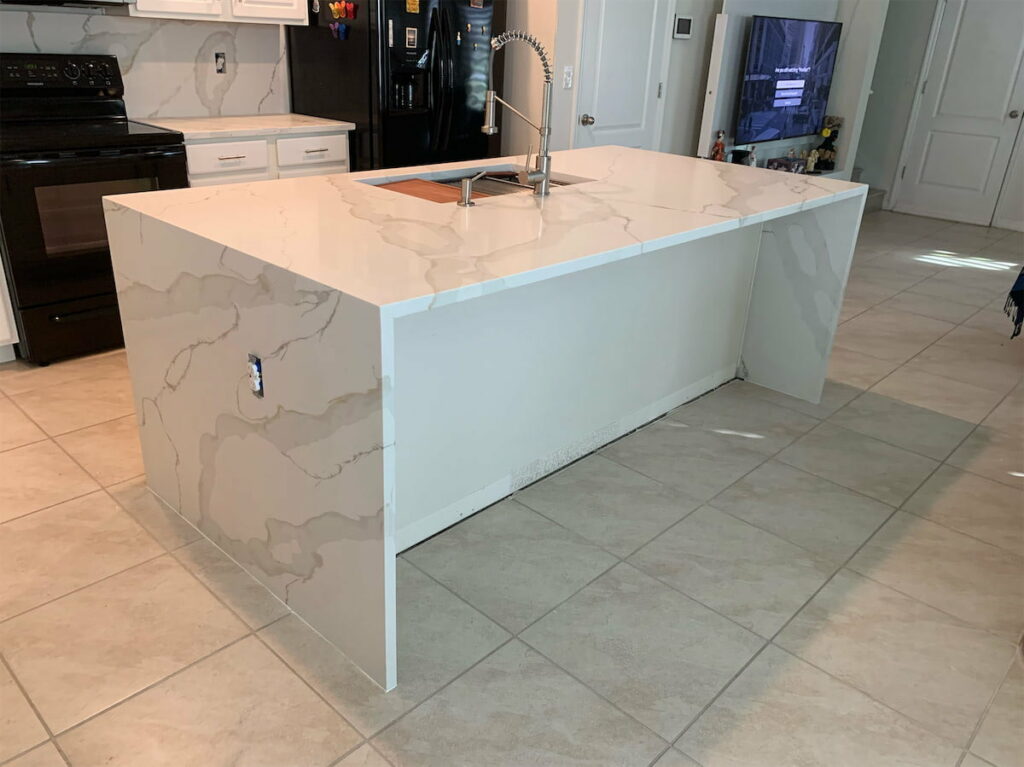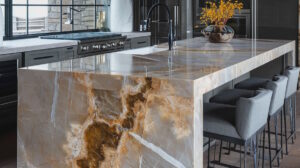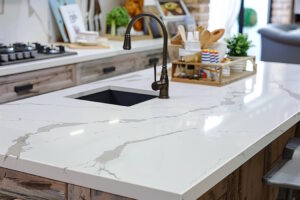A kitchen island is more than just a functional workspace; it’s often the heart of the home, where family and friends gather to cook, eat, and socialize. Choosing the perfect countertop material for your kitchen island is essential for creating your dream space. In this article, we will discuss the differences between granite and quartz countertops and guide you through the process of selecting the right one for your kitchen island.
Granite vs. Quartz: An Overview
Before diving into the details of choosing a countertop, let’s first understand the basics of granite and quartz.
Granite
Granite is a natural stone formed deep within the earth’s crust. It is composed of minerals, including quartz, feldspar, and mica, giving it a unique and beautiful appearance. Granite slabs are mined from quarries, cut into the desired size, and then polished to create a stunning countertop surface.
Quartz
Quartz countertops are engineered stone surfaces made from crushed natural quartz mixed with a small amount of resin. This manufacturing process allows for a wide range of colors and patterns, which can mimic the appearance of natural stone or have a more uniform color.
Factors to Consider When Choosing a Countertop Material
When deciding between granite and quartz countertops, consider the following factors:
Appearance
Both granite and quartz countertops offer a wide range of colors and patterns. Granite has a more natural, unique look, with each slab being one-of-a-kind. Quartz countertops have a more uniform appearance, which some homeowners prefer.
Durability
Both materials are durable and resistant to scratches, stains, and heat. However, granite is slightly more porous than quartz, making it more susceptible to staining if not properly sealed. Quartz, on the other hand, is non-porous and does not require sealing.
Cost
The cost of both granite and quartz countertops can vary depending on the specific type, color, and pattern. In general, granite tends to be more expensive than quartz, but this can change based on the rarity of the granite slab.
Maintenance
Both granite and quartz countertops require minimal maintenance. Granite needs to be sealed periodically to protect it from stains, while quartz requires no sealing. Daily cleaning for both materials involves simply wiping the surface with a mild soap and water solution.
Evaluating Your Kitchen Island Needs
Before making a decision, think about the specific needs of your kitchen island:
Functionality
Consider how you plan to use your kitchen island. Will it mainly be used for food preparation, dining, or both? Understanding your island’s primary function will help you determine the necessary durability and maintenance requirements.
Design
Your kitchen island should complement the overall design of your kitchen. Think about the colors, patterns, and styles that will best match your existing cabinetry and appliances.
Pros and Cons of Granite and Quartz Countertops
Each countertop material has its advantages and disadvantages.
Granite Pros and Cons
Pros:
- Unique, natural appearance
- Heat-resistant
- Scratch-resistant
Cons:
- Requires periodic sealing
- More susceptible to staining
- Generally more expensive
Quartz Pros and Cons
Pros:
- Wide range of colors and patterns
- Non-porous
- Low maintenance
Cons:
- Less heat-resistant than granite
- May be less desirable for those seeking a natural stone look
How to Choose the Perfect Countertop for Your Kitchen Island
Once you have considered the factors above and weighed the pros and cons of each material, you can make an informed decision about the perfect countertop for your kitchen island. Consider your budget, preferences for appearance and maintenance, and the overall design of your kitchen when making your choice.
How Edstone Inc. Can Help
Edstone Inc. is a leading provider of high-quality granite and quartz countertops. With a wide range of colors and patterns to choose from, our team of experts can help you find the perfect countertop to suit your needs, style, and budget. Contact us today to learn more about our products and services, and let us help you create the kitchen island oasis of your dreams.
Conclusion
Choosing the perfect granite or quartz countertop for your kitchen island is an important decision that requires careful consideration of various factors. By evaluating your specific needs, preferences, and budget, you can find the ideal countertop material to create a beautiful and functional kitchen island oasis.
FAQs
- Is granite or quartz better for a kitchen island? There is no definitive answer, as the choice depends on your individual preferences, needs, and budget. Both materials have their advantages and disadvantages, which should be considered when making your decision.
- How often do I need to seal a granite countertop? Granite countertops typically need to be sealed every 1-3 years, depending on the specific type of granite and the quality of the sealer used.
- Can I place hot pots and pans directly on a quartz countertop? While quartz is heat-resistant, it is not as heat-resistant as granite. It is recommended to use trivets or heat pads under hot pots and pans to protect your quartz countertop from potential damage.
- How do I clean my granite or quartz countertop? Both materials can be cleaned with a mild soap and water solution. Avoid using harsh chemicals or abrasive cleaners, as they can damage the surface.
- Where can I find a wide selection of granite and quartz countertops? Edstone Inc. offers a diverse range of granite and quartz countertop options to suit your needs, style, and budget. Contact us today to learn more about our products and services.





